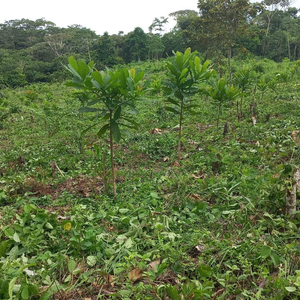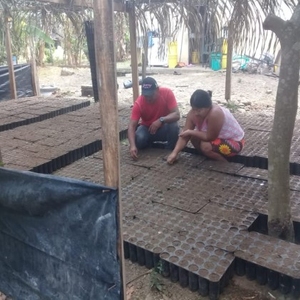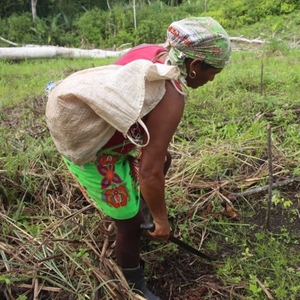Engaging with Indigenous Communities for Climate Action: The Bayano-McGill Reforestation Project
McGill University
Project Overview
The Bayano-McGill Reforestation Project is an initiative that is at the leading edge of carbon offsetting projects in higher education. The multi-faceted initiative, financed by the University, provides benefits to Indigenous communities in eastern Panama through collaborative research centred on reforestation.
Background
McGill University is committed to achieving carbon neutrality, or reaching net-zero greenhouse gas emissions, by 2040. This long-term target, first established in 2017, upholds the University’s mission to act in line with the science it produces by remaining aligned with the Intergovernmental Panel on Climate Change (IPCC)’s decarbonization timeline while accounting for Scope 1, Scope 2, and select Scope 3 emissions. The Scope 3 emissions included in this target predominantly come from student and staff commuting and university-financed air travel and, as a result, are largely unavoidable, presenting a unique challenge to reaching net-zero emissions. To reach the carbon neutrality target, the University first prioritizes reducing emissions at the source wherever possible, only offsetting unavoidable emissions.
In 2020, the Bayano-McGill Reforestation Project was initiated between McGill and two Indigenous Emberá collective lands (hereafter communities) in the Upper Bayano watershed of eastern Panama. McGill Biology professor Catherine Potvin, Canada Research Chair in Climate Change Mitigation and Tropical Forests (Tier 1), has been conducting participatory action research on forest carbon stocks, biodiversity and conservation, and Indigenous land uses and livelihoods with the Indigenous Emberá since the mid-1990s.
Goals
For McGill, the goals of the Bayano-McGill Reforestation Project include mitigating climate change, raising climate awareness among the McGill community, offering research opportunities to students, and compensating unavoidable carbon emissions through a transparent and equitable internal program. The University is now exploring a future phase that would enable McGill academic and administrative staff to contribute to the project to compensate for greenhouse gases emitted as a result of business-related travel.
The Bayano-McGill Reforestation Project equally supports social and cultural goals related to the well-being of local Indigenous communities in Panama. For the local participants, this initiative provides access to sustainable livelihoods and enhanced food security, reinforces cultural identity, and mitigates social risks for youth. This is done in part by supporting knowledge co-creation through enhancing access to computer literacy and emerging technology for monitoring forests as well as traditional participatory models grounded in cultural valuing and recovery. Through external funding secured through the Project, the project team in eastern Panama and local community members are offered workshops to build capacity on topics such as administration, leadership, communications, and networking.
Above all, the Project aims to restore local forests and increase biodiversity, including the presence of medicinal plants. McGill students who participate in the Bayano-McGill Reforestation Project through graduate research, research assistantships, and the University’s Panama Field Study Semester (PFSS) will be introduced to new views of environment and sustainability, challenging the western lens through which environmental problems are often viewed. Research generated through the Bayano-McGill Reforestation Project will contribute to the global knowledge base related to nature-based climate solutions, university-based offsetting, and Indigenous-led research. By providing students with global, pluralistic perspectives of sustainability, McGill is preparing its students to become nuanced, informed sustainability leaders and agents of change in their own communities, beyond their time at the University.
Implementation
The Bayano-McGill Reforestation Project is an initiative that is at the leading edge of offsetting projects in higher education. The multi-faceted initiative, financed by the University, provides benefits to Indigenous communities in eastern Panama through collaborative research centred on reforestation. In 2020, McGill signed an agreement with the Asociacion de Mujeres Artesanas de Ipetí Emberá (AMARIE), an Indigenous women’s NGO, and the traditional Emberá authorities in eastern Panama to plant 44,500 trees over 3 years (2020–2022) and maintain the reforested areas for 25 years. McGill students will undertake hands-on learning opportunities through the Panama Field Study Semester that will see them collaborate with Indigenous communities to monitor the project. For the Emberá, this project is crucial for creating new opportunities that uphold the fundamental relationship between territory, forest, water, and Emberá culture. The Bayano-McGill Reforestation Project is creating “bosques de vida”, or forests for life, that help bring benefits such as increased food security, improved soil quality, and access to materials for traditional housing, in addition to facilitating a transition to an economy centred around the forest as a means to achieve sustainable livelihoods.
To ensure sustainable procurement and uphold circular economy principals, local ownership plays a key role in the Bayano-McGill Reforestation Project. On-the-ground coordinators and administrators are local community members, while most of the seedlings used for reforestation come directly from a nursery in one of the communities. The project funds are distributed locally and help provide livelihoods in the region. The project also follows local traditional laws and the UN Declaration on the Rights of Indigenous Peoples principle of free, prior, and informed consent (Article 32).
One McGill faculty member, three students, and four staff participate in the governance of the Bayano-McGill Reforestation Project. In Panama, three individuals representing traditional Emberá authorities, one AMARIE representative, and one representative from the Smithsonian Tropical Research Institute (STRI) are involved in the governance structure.
Timeline
In early April 2016, the traditional authorities of the Indigenous organization, the Emberá Congress of the Alto Bayano, initiated conversations with Dr. Catherine Potvin, McGill University Biology professor and Canada Research Chair in Climate Change Mitigation and Tropical Forests (Tier 1), to follow up on the first carbon offsetting project carried out in Ipetí Emberá from 2007 to 2010 with the Smithsonian Tropical Research Institute (STRI) in Panama. Prof. Potvin has over 25 years of experience working with the Emberá Indigenous communities in Panama.
As part of the subsequent research, in 2019, two students from McGill University worked with the communities to generate preliminary reforestation project ideas that would positively impact the Emberá territory of Alto Bayano. In accordance with its internal norms, this proposal had to go through the traditional authorities and communities. There were several workshops with elders, women, youth, and local community congresses to comply with the requirements of the internal law for signing a cooperative agreement.
Also in 2019, McGill students in the Desautels Faculty of Management’s Managing for Sustainability course, MSUS 401, delivered a presentation, “Carbon Responsibility for University-Related Air Travel.” The students suggested a strategy to develop a carbon responsibility program based on findings from peer reviews and stakeholder contributions. The McGill Office of Sustainability built upon this strategy to develop a proposal for a carbon offsetting program later in the year. The Office of Sustainability then began collaborating with Prof. Potvin on the Bayano-McGill Reforestation Project.
In 2020, McGill signed an agreement with AMARIE and the traditional Emberá authorities in eastern Panama to plant 44,500 trees over 3 years (2020–2022) and maintain the reforested areas for 25 years. The ultimate goal is to allow McGillians to contribute to the purchasing of offsets produced through the Bayano plantation to compensate for emissions for air travel and commuting.
In addition to 25,000 trees planted in 2020, 3,000 were planted in 2021, with 16,500 left to plant in 2022. Throughout 2021 and 2022, internal discussions have been taking place about accessing financing and structuring a second phase of the project that would include McGill community member contributions.
Financing
The Bayano-McGill Reforestation Project is funded through internal university funding for a total of $275,000 over 3 years (2020–2022). Research related to the project has also received funding from the Government of Canada’s New Frontiers in Research Fund (approximately $200,000 CAD).
Funding for the first three years goes to structuring and kickstarting the project; after 2022, it is anticipated that McGillians will be able to pay for carbon offsets to mitigate the effects of university-related air travel, which will go towards supporting the reforestation project.
Future costs include maintenance costs such as firebreaks, landowners’ compensation, replacement for tree mortality, insecticides, local project coordination and administration, and monitoring and verification.
Results
The most tangible outcome of the project to date includes the 28,000 seedlings that have been planted so far (2020–2021), the first 25,000 of which represent 9,953 tCO2e over 25 years in offsets.
Other outcomes are:
• As of January 2022, the following have been paid for: o Payments to local landowners for planting and maintenance o 2 local project coordinators’ salaries o 28,000 seedlings o 10% admin fees for a local NGO o Equipment for irrigation and fencing o Insecticides and fertiliser
• Student research: o A summer undergraduate intern estimated the carbon sequestered by the first 25,000 trees planted, taking into account expected mortality o A Master’s student in Biology is currently creating an evaluation framework to evaluate the success of the project and comparing success of various land interventions to sequester carbon (agroforestry vs timber species in abandoned fallows) o Graduate students in the McGill-STRI Neotropical Environment Option are currently developing communications material, including stories and photos about the locals and their reforestation efforts o A Master’s student in Geography is studying the phenomenon of leakage (where locals who reforest a parcel of their land for the project simply deforest elsewhere, so the emissions “leak” from the project) o In 2023 and in subsequent years, students taking the Panama Field Study Semester will help monitor and verify the trees and the carbon stored for social acceptability and environmental integrity.
• Capacity-building for local participants: o To strengthen the technical knowledge of both the participants and the local coordinators, a training agenda was created. With the support of the Ministry of Agricultural Development (MIDA), the Ministry of the Environment (Mi Ambiente) and the Eya Pavara Project "Bosques Azules", a total of nine workshops were held on the topics of: climate change; seedling plantation; maintenance of plots of land; fire prevention; nursery preparation; pest control; use of pesticides and herbicides, and proper use of spraying equipment including backpack pumps and motor pumps; pruning and firebreaks; and agroforestry.
According to student research, other intangible project benefits that the local Indigenous communities anticipate include the transmission of traditional knowledge through educating youth about the forest and trees, promotion of traditional medicine practices, and inspiring the region/other traditional congresses to restore forests.
Lessons Learned
Relationship-building, trust, and mutual respect are necessary when developing a reforestation project in collaboration with Indigenous communities. The Bayano-McGill Reforestation project involves working with Indigenous communities that live a long distance away and who operate under different governance structures. It has been successful thanks to decades of participatory collaborations that have built the necessary relationships and trust. For example, working alongside the Indigenous communities requires negotiating their cultural and oral traditions as well as McGill’s administrative demands, such as signing memorandums of understanding and following procurement policies. The inability to visit the local communities due to the COVID-19 pandemic led participating researchers and community members to revisit the research methodology, opening the opportunity for new ways of working together that emphasize Indigenous leadership. This challenge highlights the importance of local Indigenous leadership for the long-term sustainability of projects on “natural climate solutions” like reforestation and forest conservation.
Through the first years of implementation, researchers have already identified potential to increase the carbon captured by emphasizing fire management and suppression to prevent excess mortality. Some preliminary solutions identified include watering the trees once a week for the first 16 weeks after planting and creating 6-metre-wide firebreaks around the land to reduce risk.



